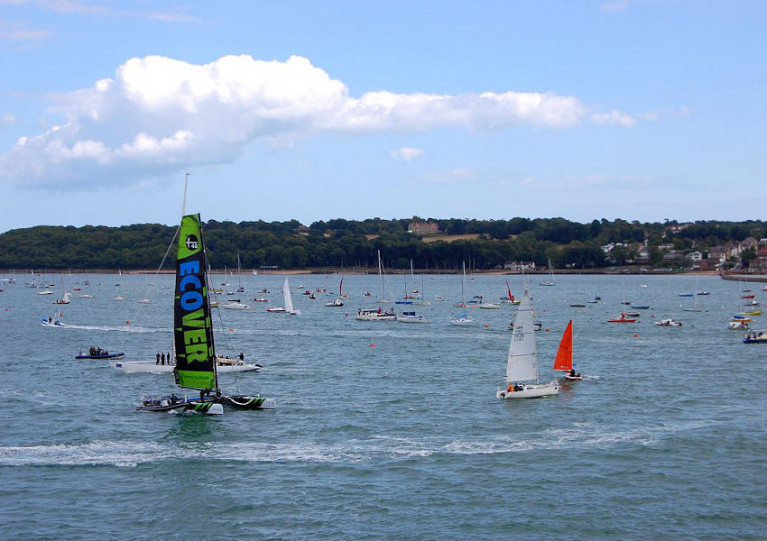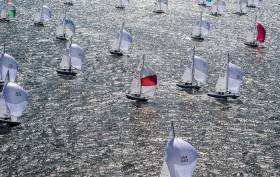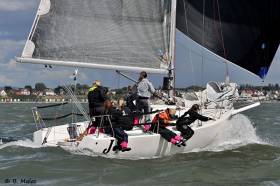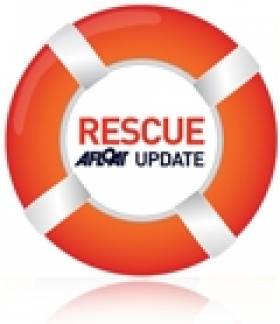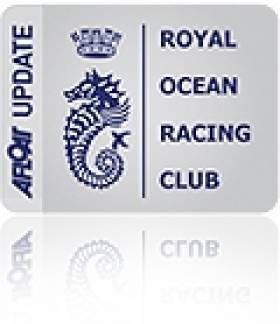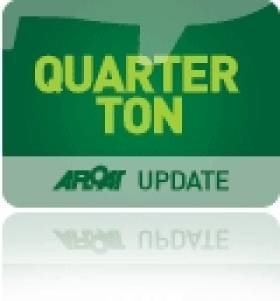Displaying items by tag: Solent
Solent Gateway, the UK’s 'fastest-growing port', is offering a unique opportunity for the renewables sector with its designated Freeport status complemented with sea, road and rail access, opening substantial growth opportunities in the region.
The Sector Deal between the offshore wind industry and the UK Government in 2019 created certainty – unmatched by other European governments – that the UK will remain the anchor market for offshore wind. In the Solent region, this has created the potential for businesses to increase their involvement in key services such as designing, building and operating offshore wind farms, as well as manufacturing blades, turbine towers and cables. The region is proving to be well-positioned to support the growth in exports and, since the Sector Deal was made, the government has developed regional offshore wind clusters, which includes Solent, and has the ambition to increase the industry’s productivity, competitiveness and innovation while helping to grow the coastal economy.
Part of this growth includes Solent Gateway’s 225-acre Marchwood Port on the south coast of England, which offers a convenient and versatile strategic base for commercial stakeholders in the renewables supply chain. Solent Gateway already has a successful track record in the sector, handling wind blades that have been shipped to the port from Vestas on the Isle of Wight, where the company manufactures the largest offshore wind turbine blades in the world for the record-breaking V164-8.0 MW turbine.
Richard Parkinson, port director at Solent Gateway said: “The facilities we have at the port for handling abnormal loads, together with our experienced operations team, means we have the flexibility and capability to handle complex bespoke project lifts. We are seeing more businesses take advantage of us having the capability to move large parts safely from the quayside to a suitable holding area before being transported throughout the UK or transhipped onto other ocean-going vessels.
“When the Freeport tax and customs site status is confirmed, it will be cheaper and easier for many raw materials to enter the UK for use in manufacturing within the Freeport. Teamed with simplified planning rules, this can help us quickly build or adapt our premises where needed. We are fortunate to be one of the very first Freeport tax and customs sites with new space available for business, so it’s a unique and cost-effective opportunity.
“Being both a customs and tax site with over 64 hectares at our disposal, it’s likely that the businesses that will benefit most from using a site like Solent Gateway, under the Freeport status, would be those which want to develop new facilities and operations. This would see them benefiting from incentives to attract new business: importing goods and components to the UK; storing goods for as long as they want without facing customs duties after 90 days; and manufacturing or assembling products, as import duties are paid on final product or component parts when they leave the Freeport, whichever is cheaper. Any organisation that wants to import, manufacture and export within a customs site will avoid all duties. Any business that wants to store items for more than 90 days may also benefit.”
Marchwood Port started life as an MoD cargo port in 1943 and was only partially developed. There is much opportunity to use the capacity available and until now there has never been access to commercial business. The added bonus of being a former MoD site is the high level of security for the cargo.
The dedicated rail line is a relatively unusual offering, which allows loads to go straight from vessel to rail and move goods across the UK through the national rail network whilst reducing the traffic on the roads. In the current climate, it is also proving popular in alleviating some of the stress associated with the current HGV driver shortages. The rail connectivity takes you to the main line at Totton and from there north into the UK’s industrial heartland.
Solent Gateway is just 15 minutes to the M27 and M3 motorways and the port offers many incentives for new business, including the option for businesses to take land and build their own bespoke storage facility and utilise the port’s highly-skilled port operations team for your cargo handling needs. Solent Gateway prides itself on collaborative partnerships with its customers and strives to create the best possible port environment to allow businesses to thrive.
Irish-Born Sailor Died After Suffering ‘Traumatic Brain Injury’ on Yacht in Solent
An Irish-born sailor died after sustaining a “traumatic brain injury” while sailing around the Solent late last year, as Southampton’s Daily Echo reports.
An inquest opening heard that Paul Kavanagh (63) was hospitalised on Friday 4 December after it was found he had hit his head on board a yacht. He died in hospital six days later.
Formerly of Dalkey in south Co Dublin, the experienced sailor had recently retired as chief executive of Imtech UK & Ireland, a leading technical services provider.
The Daily Echo has more on the story HERE.
Tension Mounts At Etchells Worlds in Cowes
It was a dramatic finish to the third day of the Etchells World Championship, sponsored by Red Funnel Ferries. John Bertrand, representing the Royal Brighton Yacht Club (AUS), was initially disqualified from Race 5, for being over early on a U-Flag start, and then re-instated after the Race Committee reviewed the decision. “We have cameras at both ends of the line and this system enabled us to have an exact picture at the start. Having reviewed this evidence some teams were re-instated for Race 5.” confirmed Principle Race Officer, Phil Lawrence.
Steve Benjamin, representing the Seawanhaka Corinthian Yacht Club (USA), scored a bullet in Race 4, and fought back from a mid-fleet start in Race 5, to end the day four points behind Bertrand. “We fully expected John (Bertrand) to be ahead when we came in. He got a great start in the last race, as did we in the race before.” commented Steve Benjamin. “I love coming to Cowes, I have been here for five Admiral's Cups and the Jubilee, and it is one of my favourite places in the world to go sailing. Today was tough again, but we have a really good team, and we are happy with our speed.”
Chris Hampton's team, representing the Royal Brighton Yacht Club (AUS), is third on countback from Noel Drennan's team, representing the Royal Hong Kong Yacht Club. “I only started sailing in 2002.” admitted Chris Hampton. “I have really only sailed in an Etchells for those years. So far in the Worlds we have tried to avoid making errors and concentrating on our speed, that has given us the results, to put us where we are. I was once told, in Etchells racing it is not about doing the extraordinary, it is about avoiding mistakes. The mood on board is excellent and our goal at the start of the regatta was to make the top ten, that is still our aim.”
Seamus McHugh's team, flying the Swiss flag, is in fifth place for the regatta after a podium finish in Race Four. Cowes Etchells Fleet Captain and Regatta Director, David Franks, had a stellar day on the water, posting two top ten finishes to lift his team, representing the Royal London Yacht Club (GBR) to 6th overall.
“Today's success was a combination of ten years sailing in the Etchells and ten years of learning so many small things.” commented David Franks. “The difference between these teams is not great, the difference is in the detail. You can get some lucky breaks, but it is all about the detail, and in particular it is about my crew, especially Graham Sunderland. He has stuck with me for years, when I was a hopeless helmsman. I was rather amused to see Ian Walker recently saying that 19 is not too young to start sailing, because I was 39!”
In the Corinthian Class, Scott Kaufman's team representing the Royal freshwater Bay Yacht Club (AUS), still leads despite being disqualified for U-Flag infringement in Race 5. Thomas Brennan's team, representing the Royal Thames Yacht Club (GBR), is now just 11 points behind Kaufman. James Badenach's team, representing the Royal Hong Kong Yacht Club, is third. Other top performers in the Corinthian Class today were Stephen Line, who scored the best result in the Corinthian Fleet for Race 5 and Bill Steele team, representing the Royal Perth Yacht Club (AUS), which had a cracking day on the water, to place the team fourth overall in the Corinthian Class.
After racing the Royal Mersey Yacht Club, which has a fleet of 12 Etchells, provided a delicious and substantial English Tea, to fortify the sailors. Tonight Etchells World Championship supporter, Red Funnel Ferries, will entertain 250 Etchells Sailors and guests at the Royal London Yacht Club. A champagne reception and plated buffet will be well received by the party. Kevin George, Chief Executive Officer Red Funnel Group, will welcome the Etchells fleet and present John Bertrand with the Red Funnel Trophy for the best combined result for Red Funnel Race Day.
Racing for the 2016 Etchells World Championship continues on Thursday 8th September. With a discard kicking in from Race 6, a big change in the results is a distinct possibility. The 2016 Etchells World Championship media team will deliver live updates, including GPS Tracking, as well as daily results, news stories, interviews, videos, and pictures.
Provisional results here
Dubarry of Ireland will be returning for the fifth year as title sponsor of the Women’s Open Keelboat Championships.
The Dubarry Women’s Open Keelboat Championships is an all-female keelboat regatta taking place in the Solent on 4-5 June 2016 and the organisers believe it is the only event of its kind in the UK.
Dubarry take inspiration from the rugged Wild Atlantic Coast and Galway’s great sailing heritage to create the highest quality leather footwear, deck shoes and sailing boots as well as a range of clothing, leather goods and accessories. Participants in the Dubarry Women’s Open Keelboat Championships will have the opportunity to win much admired Dubarry items, which will be available as prizes for class winners and in the overall Championship.
“The Dubarry Women’s Open Keelboat Championships is an event that we thoroughly enjoy being involved with, both on and off the water. The superb location and excellent organisation is complemented by eager participants with a great sense of camaraderie, making this such a great event for us to be associated with” said Marketing Director, Michael Walsh.
WOKC aims to provide high quality racing amongst female sailors whilst also offering an environment that is encouraging to female sailors newly entering the competitive side of the sport.
Jen Smyth from the WOKC organising team adds, “We are extremely grateful to Dubarry for their continued support, which enables this regatta to continue. The event is great fun, and although we compete passionately on the water the atmosphere is friendly and welcoming. We actively encourage newcomers to join us, so if you are a female skipper or boat owner, please get in touch to find out more.”
Hosted at Hamble River Sailing Club (HRSC), the regatta format focuses on IRC racing with a recommended rating of 0.88 to 1.101, split into suitable classes. One Design Classes will also be catered for if there are sufficient entries. For those with an available boat, but no current IRC certificate, the RORC Rating Office will issue a Limited Validity certificate for single event rating.
The popular Frocks & Flip-flops party takes place after racing on the evening of Saturday 4 June. Lady racers, their supporters and friends can let down their hair and raise some valuable funds for charities.
Entries are now open and early entry is advised to take advantage of the earlybird booking fee of £70, available until 17:00 on Friday 27 May. After that date, entry fee will increase to £90.
#Seven people were rescued from the Solent after their boat collided with another yacht and sank this afternoon.
The five men and two women were east of Bramble Bank when their yacht Ino collided with another named Valkyrie it has been reported.
Cowes RNLI lifeboat and Gosport independent lifeboat rushed to the scene and pulled the people out of the water.
The Cowes-based Corby 36 yacht Ino sank very quickly, according to the lifeboat team.
All people on board were wearing lifejackets and were taken to Trinity Landing in Cowes on the Isle of Wight.
No-one was seriously injured.
More on this story by the Southern Daily Echo here
25 Rescued As Car Transporter Lists In Solent
#Rescue - BBC News reports that the crew of a car transporter ship that ran aground on a sandbank in the Solent last night (Saturday 3 January) have been brought to safety.
One of the 25-strong crew was hospitalised with non life-threatening injuries after the Hoegh Osaka hit the Bramble Bank, due north of Cowes, around 9.30pm.
RNLI lifeboats from nearby Calshot, Cowes, Yarmouth and Southampton were joined by the Solent coastguard helicopter and a number of tugboats in the emergency response.
The 180m vessel is currently listing at a 45 degree angle, but it is not taking on water and is expected to be refloated.
The Bramble Bank, or Brambles, where the ship ran aground, is well known for the annual cricket match that takes place there when uncovered by low spring tides.
Solent Whisper - Sailing Catamaran With Hydrofoil System is Launched
#solentwhisper – Southampton Solent graduate Geoff Holt, the first quadriplegic sailor to sail solo across the Atlantic, will be unveiling the University's latest exciting technological development – an innovation which could change the face of small boat inshore racing.
This year's PSP Southampton Boat Show will give the industry its first real look at 'Solent Whisper' - a 5.9m sailing catamaran with a cutting-edge hydrofoil system.
Designed and built using the state-of the-art yacht design and engineering facilities at Solent's Warsash Maritime Academy and city-centre campus, the catamaran's technology has already attracted attention from world-class sailors during sea trials this summer.
The revolutionary new hydrofoil system provides stability, ease and safety, which along with an affordable projected purchase price, has the potential to offer America's Cup-style sailing to the masses. The craft's easy and stable sailing style also mean it could prove popular and accessible for disabled sailors.
Primarily designed with ease and safety in mind, Solent Whisper has also exceeded expectations on the speed front. It comfortably achieves over 25 knots and it can 'fly' on its foils in as little as five knots of wind.
The new hydrofoil technology is the brainchild of Ron Price, a Solent yacht and powercraft design graduate who is now Senior Lecturer in Naval Architecture at the University's Warsash Maritime Academy.
The prototype is the result of months of hard work made possible by the technical experience, support and skills from colleagues across the University and the state-of-the-art facilities at both the engineering workshop at the maritime academy and the composites lab at Solent.
"I was very fortunate to have access to the incredible skill and knowledge of the engineering technicians, the support of staff, and use of the superb facilities at the University," says Ron."
It is hoped that a retail production version will be available for the London Boat Show in January 2015.
"We are engineering the boat in a way that the design is smart enough to keep the production costs low," he says.
"I'm hoping that my design ideas will make inshore and small boat racing more accessible and affordable for the average club racer, those who sail for pleasure and people with disabilities," adds Ron.
Southampton Solent University has a reputation for leading the world in maritime education and technology, and Ron is one of a long line of design graduates who continue to shape the world of sailing including: Jason Ker, working on Sir Ben Ainslie's GB America's Cup bid; Guillame Verdier, who designed the yachts that came both first and second at 2012 Vendee Globe; German Frers Jr; Bill Dixon; Ed Dubois; Rob Humphreys; and Juan Kouyoumdjian.
On the sailing-side world-class Solent alumni include: Helena Lucas, who won Great Britain's first ever sailing gold at the 2012 Paralympics; Paul Goodison who took gold at the 2008 Olympics; and Herve Piveteau who sailed to victory in the Production Boat Class at the Mini Transat 2008, the French equivalent of the OSTAR
Sailor Killed In Deck Accident On Windy Solent
#Cowes - The Island Echo reports on the death of a yachtsman on the Solent this afternoon after a blow to the head from his vessel's boom.
It's understood that the yachtsman was en route from Southampton to Yarmouth when the boat was diverted to Cowes on the Isle of Wight to shelter from persisting high winds.
It marks the second incident in two days in which strong winds from the tail end of Hurricane Bertha were a factor, after a Norwegian man was treated for arm and shoulder injuries in a gybe accident.
And this afternoon at least 10 dinghy sailors were injured when the GP14 Worlds fleet capsized in a squall on Strangford Lough in Northern Ireland.
#rorc – Royal Cork's Anthony O'Leary's Ker 39, Antix has won the prestigious British IRC Championship title on the Solent this afternoon. Despitere being one of the smallest boats in Class one the Munster crew continued their impressive display, winning the first two races of the day to secure the IRC One title, and third place in the last race of the regatta was just enough to secure the overall win. Antix was crowned RORC IRC National Champion to the delight of the Irish crew.
It's an important result scored at an important time only weeks ahead of the Commodore's Cup where O'Leay will captain a three boat Irish team against some stiff international competition. Tonight, O'Leary's result was being toasted at his Royal Cork Yacht Club but the international result was also saluted in Dublin where the Irish IRC and ICRA championships were concluding at the Royal Irish Yacht Club.
The most sensational finish in the 13-year history of the RORC IRC National Championship played out in the central Solent this afternoon. In the tightly packed combat zone, the prize of overall national champion was decided in the ninth and final race of the series. Three yachts swapped the overall lead during the last three races. Keeping in clear air and playing the shifts were the big factors towards a top performance but maintaining concentration, in an adrenalin packed final day, was just all important.
"Antix has been coming here for years, we have won class here before but this is the first time we have won the event overall - it is just tremendous," smiled Anthony O'Leary. "Dave Lenz did a phenomenal job on tactics and the rest of the crew have been together for many years and that understanding kept our manoeuvres clean. The combination of smart strategy and good boat handling was the key. As one of the smallest boats in our class, we knew that we would be dictated to at the starts, and on several occasions, we did have to tack away for clear air. However, our heads never went down, and many-a-time we were in good shape by the top mark. This is a confidence boost for the Commodores' Cup but our feet will be firmly on the ground and we will continue to prepare for next month's big event."
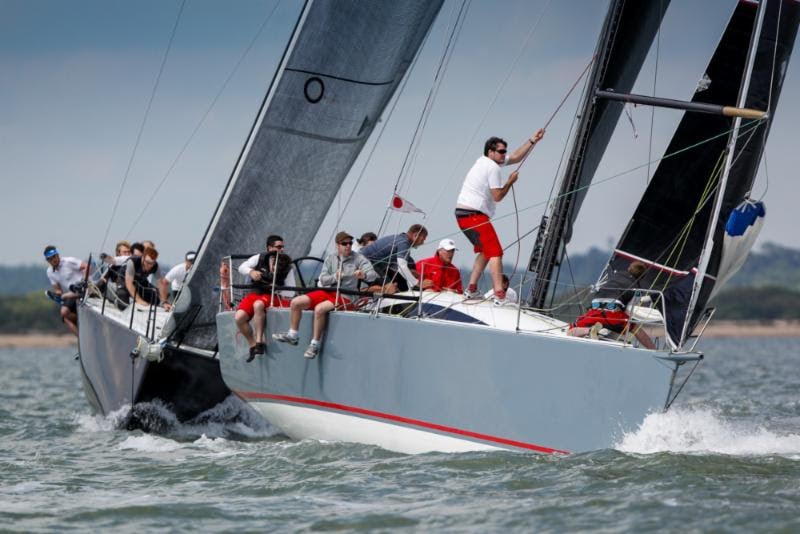
Cork's Antix in the lead on the Solent this aftenoon. Photo: Paul Wyeth
Mike Bartholomew's South African GP42, Tokoloshe II, was second in class and Marc Glimcher's American Ker 40, Catapult, finished the regatta in style winning the last race to place third.
IRC Two
Going into the last race, Jim Macgregor's British Elan 410, Premier Flair, needed to win to secure the overall IRC National title by just half a point. However, the team from Poole YC could only manage fourth. Premier Flair was class champion and second overall, winning the Jackdaw Trophy.
IRC Two produced a highly competitive fleet with seven yachts all scoring podium finishes and virtually every race was decided by seconds, so close in fact that Premier Flair and Adam Gosling's Corby 36, Yes!, scored a dead heat for Race 7. Kevin Miller's Scottish First 40, Zephyr, held on to second place for IRC Two. Yes! damaged their backstay in Race 8, ending any remote chance of a class win, but first in the last race of the regatta secured Yes! third in class.
"To be honest, if Yes! had not had their problems, we would have been beaten," admitted Jim. "The competition in our class this year was as good as I can remember and we are delighted to be taking the Jackdaw Trophy back to Poole YC. We had no idea we were in the running for the overall win, that comes as a bit of a shock for a Corinthian team. We were just taking it one race at a time, and thoroughly enjoyed every one of them."
IRC Three
David Franks' British JPK 10.10, Strait Dealer, won all three races today to secure the class. Scoring six bullets during the regatta, Strait Dealer was an outstanding performer. However, the smaller class size put the team from Cowes out of the running for the overall win. Last year's IRC Three champion, James Chalmers' British J/35, Bengal Magic, was second and Willem Schopman's Dutch Bashford Howison 36, Intention, was third.
"This is our second class win at the championship but every year it gets harder and harder," commented David. "The RORC have put on another excellent event, especially in difficult conditions, and that should not be underestimated. Each day was very different and all of the Solent came into play, at one stage or another, which kept us all thinking, as well as the race officer."
IRC Four
Peter Morton's Half Tonner, Swuzzlebubble, was the winner of the class but struggled today in the fresher breeze. Giovanni Belgrano's Whooper won the first race of the day and secured second overall. Sadly, Ian Southworth's Hamble based Quarter Tonner, Whiskers, was unable to race after yesterday's rig damage, but after being awarded redress, ended the regatta third in class. Michael Kershaw's Half Tonner, Chimp, won Race 8 and last year's class winner, Nick and Adam's J/97, Indulgence, finished the regatta on a high, winning the last race.
"This is the first big regatta for the boat since it was re-launched and we have learnt a lot about how to sail her," commented Peter Morton, skipper of Swuzzlebubble. "We were joined this weekend by Tom Schnackenberg, who has won the America's Cup three times and knows a hell of a lot about these boats. I bought Swuzzlebubble for one euro, I have spent a lot of money on her, but about only half the cost of some of the boats racing this weekend. She definitely goes well in the light but against the displacement boats, we suffered in more breeze."
Racing with the Royal Ocean Racing Club continues with the Morgan Cup Race on Friday 27th June, followed by the Round Ireland Race, Saturday 28th June.
Click HERE for full provisional results for the RORC IRC National Championship.
Irish Boats in Top Half at Solent Quarter Ton Cup
#quarterton – Both Irish entries at this years Quarter Ton Cup 2013 at the Royal Corinthian Yacht Club finished in the top half of the fleet after a sunshine filled series on the Solent. Jason and Dominic Losty Illes Pitiuses from Cove Sailing Club finished in 11th and Cork Harbour neighbour, Anchor Challenge skippered by Diarmuid Foley from Royal Cork finished eighth in a fleet of 26. Results here.
The closing day of the Coutts Quarter Ton Cup 2013 produced one final stunning race in perfect conditions for the 26-strong fleet. Again the boats had to wait for wind and several of the teams will have been hoping that it would fill in early enough to run multiple races, but it was not to be and only one start was possible before the 14.30 cut off time.
With an eight point lead going into the day and a worst result of seventh Louise Morton and her crew aboard the 1980 Bruce Farr designed Espada had the regatta in the bag with a race to spare, although they still chose to come out and sail regardless.
Espada's position might have been secure, but the battle for the remaining podium places was wide open. Rickard Melander's Alice II, Bullit, helmed by Ashley Curtis, Ian Southworth in Whiskers and Willy McNeil & Mike Pascall's Illegal Immigrant went into the day separated by just 6.5 points so it was game on.
Coutts' Executive Director Peter Burke announced a new trophy called the Kemp Trophy, presented by Coutts in honour of Stephen Kemp, the Coutts' Director who initiated their sponsorship of this event and who sadly lost his battle with cancer earlier this year. Stephen loved how welcoming the class is and how the event encourages people to get involved and the trophy will be presented annually to a boat which the organisers feel most embodies that spirit. The inaugural winner of the Kemp Trophy was Eric Reynolds' Magnum Evolution which was taking part in her first ever Coutts Quarter Ton Cup and the presentation was made by Stephen's young sons Samuel and Joseph.
Final Top Five
1. Espada, Louise Morton, GBR, 17 points
2. Alice II, Rickard Melander, SWE, 21
3. Illegal Immigrant, W McNeill & M Pascall, GBR, 25.5
4. Bullit, Ashley Curtis, FRA, 25.5
5. Whiskers, Ian Southworth, GBR, 29.5


























